|
|
|
Sort Order |
|
|
|
Items / Page
|
|
|
|
|
|
|
| Srl | Item |
| 1 |
ID:
104044
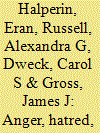

|
|
|
|
|
| Publication |
2011.
|
| Summary/Abstract |
Anger is often viewed as a destructive force in intergroup conflicts because of its links to aggressive behavior. The authors hypothesized, however, that anger should have constructive effects in those with low levels of hatred toward the out-group. Using experimental designs with subsamples of nationwide representative surveys, the authors conducted two studies within the context of the Israeli-Palestinian conflict. Study 1 showed that inducing anger toward Palestinians several weeks before the Annapolis summit increased support for making compromises in upcoming negotiations among those with low levels of hatred but decreased support for compromise among those with high levels of hatred. Study 2 showed that, even when a strong anger induction was used just days before the summit, the anger induction led to increased support for compromise among those low in hatred, but not among those high in hatred. The authors discuss the implications of these findings for informing a psychological understanding of conflicts.
|
|
|
|
|
|
|
|
|
|
|
|
|
|
|
|
| 2 |
ID:
137241


|
|
|
|
|
| Summary/Abstract |
Who did it? Attribution is fundamental. Human lives and the security of the state may depend on ascribing agency to an agent. In the context of computer network intrusions, attribution is commonly seen as one of the most intractable technical problems, as either solvable or not solvable, and as dependent mainly on the available forensic evidence. But is it? Is this a productive understanding of attribution? — This article argues that attribution is what states make of it. To show how, we introduce the Q Model: designed to explain, guide, and improve the making of attribution. Matching an offender to an offence is an exercise in minimising uncertainty on three levels: tactically, attribution is an art as well as a science; operationally, attribution is a nuanced process not a black-and-white problem; and strategically, attribution is a function of what is at stake politically. Successful attribution requires a range of skills on all levels, careful management, time, leadership, stress-testing, prudent communication, and recognising limitations and challenges.
|
|
|
|
|
|
|
|
|
|
|
|
|
|
|
|
| 3 |
ID:
141816
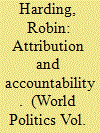

|
|
|
|
|
| Summary/Abstract |
Do voters in Africa use elections to hold governments accountable for their performance in office? In contexts of limited information and weak state capacity, it can be difficult for citizens to attribute the provision of public goods and services to political action. As a result, voters often have little information about government performance on which to condition their electoral support. Such contexts are frequently characterized by clientelism or ethnic politics, and there is a widespread impression that African elections are little more than contests in corruption or ethnic mobilization. Using an original panel data set containing electoral returns and detailed information on road conditions throughout Ghana, the author provides robust evidence that when a public good can be attributed to political action, as is the case with roads in Ghana, electoral support is affected by the provision of that good. The author also uses data on a variety of educational inputs to test the claim that votes are conditioned only on attributable outcomes.
|
|
|
|
|
|
|
|
|
|
|
|
|
|
|
|
| 4 |
ID:
196608


|
|
|
|
|
| Summary/Abstract |
States and non-state actors conduct unclaimed coercive attacks, inflicting costs on adversaries to signal resolve to prevail in a dispute while refraining from claiming or denying responsibility. Analysts argue that targets often know who is responsible, which enables coercive communication, and that the lack of claims of responsibility grants coercers plausible deniability in the eyes of third parties. The puzzle of different audiences holding different beliefs about who is behind an unclaimed attack, even when they may have the same information, has been neglected. We address this puzzle by theorising that targets and third parties tend to reach different conclusions due to distinct emotional reactions: targets are more likely to experience anger, which induces certainty and a desire to blame someone, as well as heuristic and biased information processing, prompting confident attribution despite the limited evidence. A vignette-based experiment depicting a terrorist attack lends empirical plausibility to our argument.
|
|
|
|
|
|
|
|
|
|
|
|
|
|
|
|
| 5 |
ID:
171962
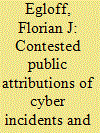

|
|
|
|
|
| Summary/Abstract |
Public attributions of cyber incidents by governments and private industry have become prevalent in recent years. This article argues that they display a skewed version of cyber conflict for several operational and structural reasons, including political, commercial, and legal constraints. In addition, public attribution of cyber incidents takes place in a heavily contested information environment, creating fractured narratives of a shared past. The article uses three cyber incidents (Sony Pictures, DNC, and NotPetya) to show how actors cope with this contested information environment and proposes a changed role of academia to address some of the problems that emerge. To become competent in contesting public attribution discourses, universities would have to work more across physical, disciplinary, and academic boundaries. The main implications for democracies are to be more transparent about how attribution is performed, enable other civilian actors to study cyber conflict, and thereby broaden the discourse on cybersecurity politics.
|
|
|
|
|
|
|
|
|
|
|
|
|
|
|
|
| 6 |
ID:
191978
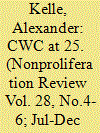

|
|
|
|
|
| Summary/Abstract |
This article analyzes the shifting focus of the Chemical Weapons Convention (CWC) during the first 25 years of its implementation, from the verification of destruction of declared chemical-weapon (CW) stockpiles to the attribution of CW use. The article identifies the repeated use of chemical weapons by Syria and the resultant creation of a new attribution norm under the CWC as a critical juncture in the regime’s evolution. Repeated calls for accountability for the use of so-called Novichok nerve agents for assassination purposes serve as the first manifestation of the new attribution norm. The article further outlines steps CWC states parties should take in the context of the Fifth CWC Review Conference in May 2023 to prepare the CW-prohibition regime for its next 25 years of operation by (1) adapting the implementation of key regime norms following the anticipated completion of CW destruction later in 2023 and (2) incorporating the investigation and attribution work of the Investigation and Identification Team into the programmatic work of the OPCW.
|
|
|
|
|
|
|
|
|
|
|
|
|
|
|
|
| 7 |
ID:
120288
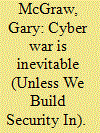

|
|
|
|
|
| Publication |
2013.
|
| Summary/Abstract |
The information systems controlling our critical infrastructure are vulnerable to cyber attack. Cyber war is therefore inevitable unless we improve our cyber defenses. The only way to do this is by building security into systems at the design stage.
|
|
|
|
|
|
|
|
|
|
|
|
|
|
|
|
| 8 |
ID:
196009


|
|
|
|
|
| Summary/Abstract |
When it comes to cybersecurity incidents – public opinion matters. But how do voters form opinions in the aftermath of cyberattacks that are shrouded in ambiguity? How do people account for the uncertainty inherent in cyberspace to forge preferences following attacks? This article seeks to answer these questions by introducing an uncertainty threshold mechanism predicting the level of attributional certainty required for the public to support economic, diplomatic or military responses following cyberattacks. Using a discrete-choice experimental design with 2025 US respondents, we find lower attributional certainty is associated with less support for retaliation, yet this mechanism is contingent on the suspected identity of the attacker and partisan identity. Diplomatic allies possess a reservoir of good will that amplifies the effect of uncertainty, while rivals are less often given the benefit of the doubt. We demonstrate that uncertainty encourages the use of cognitive schemas to overcome ambiguity, and that people fall back upon pre-existing and politically guided views about the suspected country behind an attack. If the ambiguity surrounding cyberattacks has typically been discussed as an operational and strategic concern, this article shifts the focus of attention to the human level and positions the mass public as a forgotten yet important party during cyber conflict.
|
|
|
|
|
|
|
|
|
|
|
|
|
|
|
|
| 9 |
ID:
191909
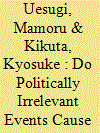

|
|
|
|
|
| Summary/Abstract |
We examine whether politically irrelevant events can cause conflicts, by analyzing the effects of professional football games in Europe on protests in Africa—an unintended spillover across the continents. By expanding psychological theories, we argue that the outcomes of the football games in Europe can affect African people's subjective evaluation of domestic politicians, which in turn can trigger protests. By exploiting as-if random variation in the results of 15,102 close football games conditional on betting odds, we find that compared to draw games, close losses of African players’ teams increase peaceful protests in their original countries while not changing the likelihood of riots or armed conflicts. The effect is particularly large for non-ethnic protests targeted at a central government. Close losses also temporarily decrease people's trust in their country's leader. By contrast, close victories do not have equivalent or compensating effects on protests or public opinion. These results suggest asymmetric misattribution: people in Africa unreasonably blame domestic politicians for bad luck in European football games, prompting protests; but they do not credit politicians with football victories.
|
|
|
|
|
|
|
|
|
|
|
|
|
|
|
|
| 10 |
ID:
171054
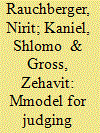

|
|
|
|
|
| Summary/Abstract |
This article presents a multi–variable model for the judgement of complex events in an intercultural situation. The participants in the study were 244 female students, who expressed negative emotions towards the events. Results of comparative analysis of the three events showed that the difference was not significant, χ2(34) = 36.47, p > 0.05, the events were similar with respect to the patterns of the structures of the connections between the variables, as predicted by the theoretical model. Forming judgements according to the model’s criteria will lead to greater moderation and mutual tolerance and to advancing and developing intercultural competence.
|
|
|
|
|
|
|
|
|
|
|
|
|
|
|
|
| 11 |
ID:
196750


|
|
|
|
|
| Summary/Abstract |
Biological events—including outbreaks and pandemics, biological-weapons use, and accidental laboratory release—have the potential to be extremely disruptive. The ability to accurately investigate, identify the origins of, and attribute these events is critical for deterring deliberate events and implementing interventions to prevent future natural or accidental events. However, historical examples of biological-event attribution and origins investigations illustrate significant gaps in processes, from technical capabilities to communications, and have not resulted in conclusive consensus among decision makers, the public, and scientists. The research described in this article aimed to assess attitudes and expectations of a broad range of stakeholders regarding investigations and the evidence they generated for biological attribution. The authors interviewed 41 experts in disciplines related to attribution and investigations and then analyzed the interview content using a mixed-methods approach. Interviews generated a list of factors to consider when planning or conducting investigations. Among the interviewees, opinions varied by field of study on how to analyze the biological samples, how to communicate the results of the investigation, and how feasible it would be to reach a conclusion about who was responsible. Participant opinions varied less with regard to requirements, protocols, and guidelines thought to be important to maintaining confidence in the technical details of an investigation and the evidence it produces. Findings from this study can inform planning for future events.
|
|
|
|
|
|
|
|
|
|
|
|
|
|
|
|
| 12 |
ID:
171149
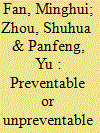

|
|
|
|
|
| Summary/Abstract |
China’s polluted air has seriously affected the health of the Chinese population. This paper uses attribution theory to investigate how Chinese newspapers and non-Chinese newspapers presented smog in China and attributed causes and responsibilities. Built on previous studies, this study adopted covariation model within attribution theory and painted an interesting picture of smog coverage by Chinese and non-Chinese newspapers because of the apparent differences in perspectives. The criteria further provided folder for elaboration on explaining why the different coverages attributed causes as they did. Implications are discussed.
|
|
|
|
|
|
|
|
|
|
|
|
|
|
|
|
| 13 |
ID:
190772
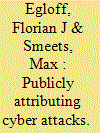

|
|
|
|
|
| Summary/Abstract |
When should states publicly attribute cyber intrusions? Whilst this is a question governments increasingly grapple with, academia has hardly helped in providing answers. This article describes the stages of public attribution and provides a Public Attribution Framework designed to explain, guide, and improve decision making of public attribution by states. Our general argument is that public attribution is a highly complex process which requires trade-offs of multiple considerations. Effective public attribution not only necessitates a clear understanding of the attributed cyber operation and the cyber threat actor, but also the broader geopolitical environment, allied positions and activities, and the legal context. This also implies that more public attribution is not always better. Public attribution carries significant risks, which are often badly understood. We propose the decision maker’s attitude towards public attribution should be one of ‘strategic, coordinated pragmatism’. Public attribution – as part of a strategy – can only be successful if there is a consistent goal, whilst the avenues for potential negative counter effects are assessed on a case-by-case basis.
|
|
|
|
|
|
|
|
|
|
|
|
|
|
|
|
| 14 |
ID:
161325
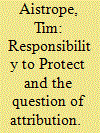

|
|
|
|
|
| Summary/Abstract |
This article explores the problem of attribution in the context of Responsibility to Protect (R2P) intervention through an analysis of the Syrian chemical weapons attack of 2013. We argue that R2P advocates can be confronted by a crisis dynamic where the political momentum for military intervention runs ahead of independent verification and attribution of mass atrocity crimes. We contrast the political momentum for intervention with the technical process of independent attribution and show that the sort of independent evidence that would ideally legitimize an R2P intervention was unavailable when there was political momentum for action. Conversely, the information that was available (which inevitably informed the political momentum for action) was largely produced by state intelligence organizations – or a potentially briefed media – and shaped by the interests and priorities of its end users. While understandable in the face of the ‘extreme’, we suggest that the mobilization of political momentum by R2P advocates entails significant dangers: first, it risks undermining the integrity of R2P if evidence is later discredited and second, it risks amplifying the perception that states sometimes exploit humanitarian pretexts in pursuit of other strategic ends.
|
|
|
|
|
|
|
|
|
|
|
|
|
|
|
|
| 15 |
ID:
187493
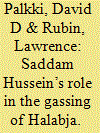

|
|
|
|
|
| Summary/Abstract |
Iraq’s use of chemical weapons against Iraqi Kurdish civilians in 1987 and 1988 is among the most morally troubling events in the latter half of the twentieth century. Most of the questions surrounding the attack, including why, when, and how, have been addressed in path-breaking research by Joost Hiltermann and other researchers from Human Rights Watch. However, even as more records and internal documents from the period have come to light, one question remains unresolved: Did Saddam Hussein, Iraq’s leader, directly order the gassing of Iraqi Kurds? This study reassesses the Halabja attack of 1988—in particular, Saddam’s thinking and behavior relating to the attack—in light of the post-2003 evidence. It synthesizes insights from the Iraqi records at the Conflict Records Research Center and Stanford University; debriefings of Iraqi principals, which the authors obtained in response to Mandatory Declassification Review requests; recent memoirs of Iraqi and US officials; and other previously unexplored sources. Although these records provide no direct proof that Saddam Hussein issued an explicit order to gas Halabja, it is clear he created a command environment in which the indiscriminate gassing of Iraqi Kurds was considered permissible and even desirable.
|
|
|
|
|
|
|
|
|
|
|
|
|
|
|
|
| 16 |
ID:
165331
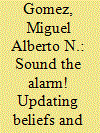

|
|
|
|
|
| Summary/Abstract |
To date, cyber security research is built on observational studies involving macro-level attributes as causal factors that account for state behaviour in cyberspace. While this tradition resulted in significant findings, it abstracts the importance of individual decision-makers. Specifically, these studies have yet to provide an account as to why states fail to integrate available information resulting in suboptimal judgements such as the misattribution of cyber operations. Using a series of vignette experiments, the study demonstrates that cognitive heuristics and motivated reasoning play a crucial role in the formation of judgements vis-à-vis cyberspace. While this phenomenon is frequently studied relative to the physical domain, it remains relatively unexplored in the context of cyberspace. Consequently, this study extends the existing literature by highlighting the importance of micro-level attributes in interstate cyber interactions.
|
|
|
|
|
|
|
|
|
|
|
|
|
|
|
|
|
|
|
|
|